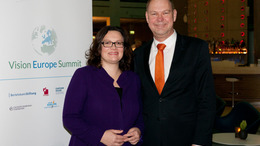
© Kzenon / Shutterstock Images
Vision Europe Summit 2015: New Ideas for a Social Europe
Islamist terror, the Euro crisis and the migrant question pose a variety of challenges to Europe. Ensuring peace and stability within Europe will depend on how well social and welfare systems in Europe are maintained and fostered. How to go about this was the topic of the first Vision Europe Summit held in Berlin in November 2015.
On November 17th and 18th, the Bertelsmann Stiftung convened in Berlin together with six of Europe's leading think tanks at the inaugural Vision Europe Summit to discuss the future of the welfare state and social models throughout Europe. Participants focused on how to ensure the sustainability of such models into the future. Among the number of high-level participants present were Andrea Nahles, Germany's federal minister of labor and social affairs, Members of the European Parliament and advisors to the European Commission.
Today, discussions of a European crisis generally refer to the challenges posed by the massive inflow of refugees, bailout packages within the euro area or Islamist terror. Preserving peace and well-being through social stability is at the heart of the European project. The values and norms underlying the European social model constitute, for many people, the essence of what it means to be European.
Ensuring the sustainability of social welfare systems across Europe
Europe's welfare states face a number of challenges. Pressures on public finances and the burden that social spending poses for an economy's "productive" sector raise questions as to whether EU member states can continue to afford their welfare systems.
Welfare systems that were established in the postwar era must be reformed if they are to meet the challenges facing European states today. Indeed, they must accommodate the transformative societal changes underway that are associated with demographic change, a global economy and the negative impact of climate change.
EU member states must also prove capable of responding to new social risks developing as a result of the changing nature of work and employment. Doing so calls for greater efficiency in the use of resources and relevant advances in technology without compromising core principles such as solidarity.
Often overlooked, however, is the fact that Europe's welfare states and EU institutions alike frequently serve several redistributive functions in protecting the disadvantaged. In contrast to the negative images so often propagated about the social welfare state, these states also invest in their citizens' human and social capital. Throughout the course of their lives, all EU citizens both use and contribute to the system at different points along the way.
Reforming welfare systems de facto involves challenges regarding appropriate decision-making processes and democratic oversight. But there is ample reason to be optimistic about the future of the European social model. Efficiently structured welfare systems have the capacity to foster sustainable growth and are therefore a competitive asset.
Digitization as a driving force behind European welfare systems
Shifting the focus away from a distribution of burdens toward preventing risks and linking fairness as a principle to social investments that mitigate social risks is one viable reform approach identified by Aart De Geus, Chairman of the executive board of the Bertelsmann Stiftung. Emphasizing that preventive action is always preferable to ex post attempts to fix a problem, De Geus pointed to measures targeting the reintegration of workers into the labor market, improvements to early childhood education and preventive care through health awareness. Yet some states in the EU lag far behind in these and other areas.
Federal Minister Andrea Nahles called upon participants at the summit to not lose sight of the long-term challenges in the face of the current crises. An increasingly digitized workplace is just one issue highlighted by the minister as posing specific problems for social policy and Europe’s welfare states. As business models of firms such as Google and Uber could soon undermine the basis of welfare state systems, Europeans cannot afford to ignore these developments. Citing Germany’s social partnership model as a promising approach to addressing such developments, the minister also lauded a political culture that also recognizes the opportunities inherent to technical challenges such as digitization.
Please find more information about the Vision Europe Summit here. An overview about the event publications can be found here.




